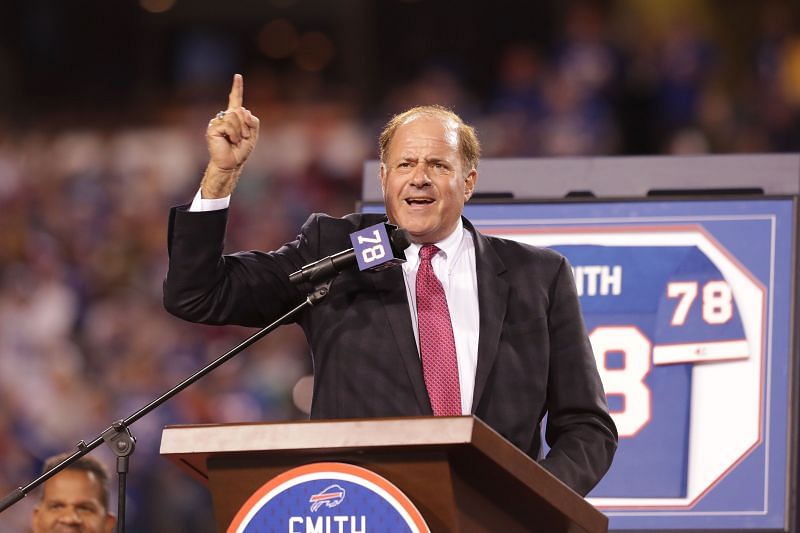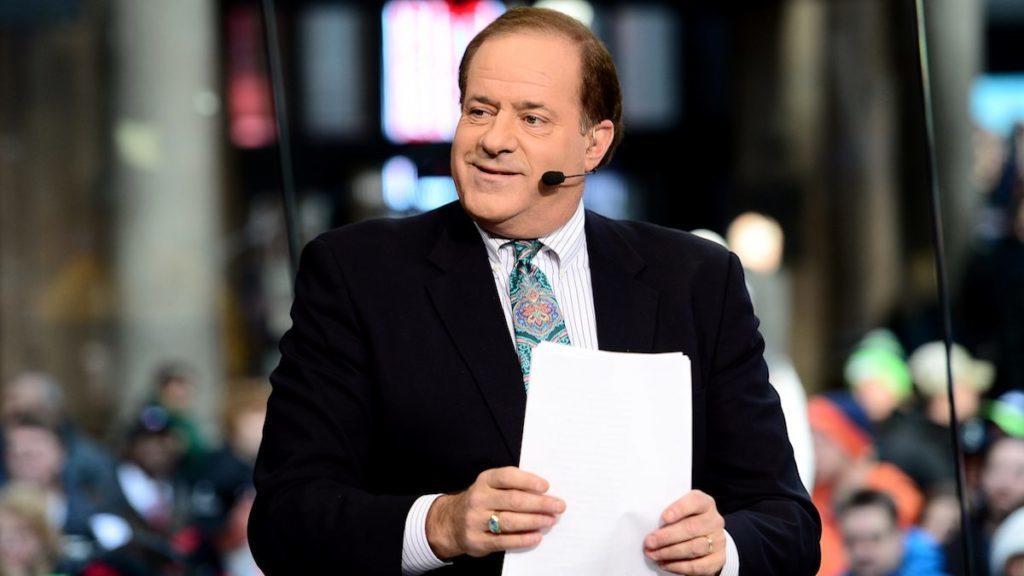Chris Berman Salary: Latest Earnings & Details
How much does Chris Berman earn? Understanding the compensation of a prominent figure in sports broadcasting.
A figure's compensation in professional fields, such as broadcasting, reflects a combination of experience, skill, and market value. In the case of Chris Berman, his earnings represent a significant factor in the broadcasting industry, providing insights into the rewards associated with a career in sports media.
Determining precise earnings for prominent figures often involves a complex interplay of base salary, bonuses, endorsements, and other financial benefits. Publicly available information on compensation for individuals in this realm is frequently limited or not consistently reported. Therefore, an exact figure for Chris Berman's earnings is not readily available. However, the substantial scale of his career, spanning many years of prominent sports broadcasting, strongly suggests a high level of compensation. The prominence of the role and its influence in the sports media market are key factors in estimating this.
| Name | Profession | Notable Achievements |
|---|---|---|
| Chris Berman | Sports Broadcaster | Long-standing career, highly recognized voice in sports broadcasting. |
This information, while not definitive, provides valuable context about compensation in the sports broadcasting sector. A deeper understanding of the compensation structure can further explore the economics of the industry. This provides insight for aspiring broadcasters or those interested in the financial aspects of the media landscape.
Chris Berman Salary
Understanding Chris Berman's compensation provides insights into the financial aspects of a prominent sports broadcasting career. Factors influencing such compensation are multifaceted.
- Experience
- Position
- Performance
- Market value
- Contract terms
- Broadcasting network
Chris Berman's salary, though not publicly detailed, is likely tied to factors such as years of experience in sports broadcasting, the prominent position he held at ESPN, and the value his performances generated. Contract terms, including potential bonuses and benefits, further contribute to overall compensation. Networks like ESPN often set compensation benchmarks based on industry standards and individual performer contributions, thus a specific salary range could be influenced by the network the broadcaster works for. Precise figures remain unavailable, yet this framework offers insight into the factors contributing to lucrative careers in broadcasting, highlighting the intertwined nature of skill, position, and financial rewards.
1. Experience
Professional experience, particularly in high-profile roles like sports broadcasting, significantly impacts compensation. Extensive experience often correlates with higher earning potential. This is particularly relevant when considering a figure like Chris Berman, whose long career likely contributed substantially to his remuneration.
- Years of Service
A substantial amount of time in the field, especially at prominent broadcasting networks, generally suggests accumulated expertise and recognized value. Longer tenures frequently translate to increased compensation. This accrual often reflects consistent performance and the development of valuable industry connections.
- Industry Recognition and Awards
Awards and accolades within the sports broadcasting industry highlight excellence and established expertise. Recognition from peers and industry leaders often signals substantial contribution and, consequently, higher earning potential. For instance, long-standing achievements and prestigious awards can influence compensation packages.
- Proven Track Record
Consistent high-quality performance, evident through ratings, viewership, or critical reception, demonstrates a sustained ability to deliver value to the organization or network. A history of successful performance is frequently factored into compensation decisions, leading to a strong correlation between experience and earnings. This includes career longevity and impactful work throughout the broadcasting period.
- Specialized Skills and Expertise
Development of specialized skills and in-depth knowledge within a niche, such as advanced sports analysis or unique broadcasting techniques, often elevates an individual's market value. Such specialized skill sets can contribute to higher compensation, as employers recognize the premium on valuable expertise. Furthermore, a specialization in a segment of sports or a broadcast technique leads to higher market value and subsequent compensation.
In conclusion, the correlation between experience and compensation is evident in the field of sports broadcasting. Factors like years of service, industry recognition, performance track record, and specialized expertise all contribute to an individual's market value, ultimately impacting their earnings. This is true for individuals of Chris Berman's stature. A long and successful career in the broadcasting field accumulates significant experience, often reflected in their remuneration. The broader significance of professional experience within this context is its strong relation to compensation.
2. Position
The position held within a professional sports broadcasting organization significantly influences compensation. Higher-level positions, often associated with greater responsibility and visibility, typically command higher salaries. This relationship is not arbitrary; it reflects the perceived value and contribution associated with specific roles.
For instance, a lead commentator or anchor at a major sports network like ESPN, holding a prominent position, often necessitates a substantial financial commitment. Such a position usually involves extensive responsibilities, including live broadcasts, program hosting, and potentially managing a team of staff. The perceived value of the role, in terms of audience reach and influence, directly correlates with the expected compensation. Conversely, a less prominent position within the same organization might have a significantly lower salary, despite the individual holding comparable expertise.
Understanding this connection between position and compensation provides valuable insight into the financial dynamics within the sports broadcasting industry. It highlights the complex interplay of factors that contribute to remuneration, including not only individual expertise but also the organizational hierarchy and the perceived value of a specific role. This understanding is pertinent for aspiring broadcasters, helping them understand the factors influencing their potential earning trajectory within this field. It also informs the overall dynamics of compensation structures within professional settings, regardless of the industry.
3. Performance
Performance in sports broadcasting, as a critical component in compensation, often directly correlates with a broadcaster's salary. High-quality performance, consistently delivering engaging and informative content, directly influences a broadcaster's value to the organization. This value, in turn, often translates into a higher compensation package. A presenter who consistently engages the audience, providing insightful commentary and analysis, usually receives greater financial rewards than one whose performance is less impactful.
Consider specific examples within the broadcasting industry. Consistent high ratings for a program, positive audience feedback, and industry accolades are indicators of strong performance. These factors can lead to increased viewership, enhanced brand reputation, and, ultimately, greater financial compensation for the broadcasting team, including individuals like Chris Berman. The reverse is also true; a decline in performance or consistent negative audience reaction may result in reduced compensation or even employment termination.
The significance of performance in compensation structures is crucial for understanding the relationship between talent and reward in the media industry. For aspiring broadcasters, understanding this connection is vital. A commitment to consistently high-quality performance, whether through engaging commentary, thorough research, or strong on-air presence, can positively influence their earning potential. This understanding highlights a key element of professional success in broadcasting and other fields, emphasizing the direct link between performance and financial outcome. Furthermore, the direct correlation emphasizes the role of accountability and consistent high-quality delivery for sustained success and remuneration.
4. Market Value
Market value, a crucial component in determining compensation, plays a significant role in establishing a figure like Chris Berman's salary. It reflects the perceived worth of an individual's skills and contributions in the broader marketplace. A broadcaster with substantial experience, high ratings, and recognition within the sports media industry commands a higher market value, leading to a correspondingly higher salary. Factors like audience engagement, insightful commentary, and established expertise contribute to this perceived market value. The connection between market value and salary is direct; a higher market value typically results in a higher salary.
Several factors contribute to determining market value in the context of sports broadcasting. Broadcasting experience, including years of service and the nature of previous roles, significantly impacts a broadcaster's value proposition. High-profile appearances, consistent quality of work, and the ability to attract viewership all contribute. Furthermore, a broadcaster's ability to generate ratings and attract sponsors influences market value. Consider professional athletes; their market value is directly tied to performance on the field. Similarly, broadcasters whose work is widely recognized for its insightful commentary and entertainment value often command a higher market rate. The value in broadcasting, like that in any professional field, is directly linked to the perceived worth of the output.
In conclusion, market value is a critical factor influencing compensation in professional sports broadcasting, directly impacting earnings like Chris Berman's. This value is multifaceted, reflecting a combination of experience, performance, audience engagement, and industry recognition. Understanding this connection provides insight into the financial realities of the broadcasting industry, highlighting the importance of consistently delivering high-quality content to maintain and enhance market value, and ultimately, salary. This principle applies across various professions, emphasizing the fundamental relationship between performance and financial compensation.
5. Contract Terms
Contract terms are a critical aspect in determining compensation for individuals in professional fields, including sports broadcasting. A contract's specifics significantly influence the financial arrangements for figures like Chris Berman, outlining the compensation structure and other crucial elements. Analyzing these terms provides a clearer understanding of the financial aspects of careers in sports broadcasting.
- Base Salary
This foundational component of a contract stipulates the fixed amount of compensation received for the agreed-upon services. Base salaries vary based on factors like the broadcaster's experience, position, and market value. In the case of a prominent broadcaster like Chris Berman, the base salary likely reflects a considerable sum, reflecting their experience and market demand. For example, a leading anchor's base salary would likely be higher than a junior reporter's.
- Bonuses and Incentives
Contract terms often include provisions for bonuses, performance-based rewards, or incentives tied to specific achievements. These can significantly enhance total compensation. For example, if a broadcaster consistently exceeds ratings targets, the contract may specify bonus payments. This element provides a financial incentive to maintain high standards of performance and audience engagement. The bonus structure in Chris Berman's contract likely included various benchmarks and incentives for exceptional performance.
- Benefits Package
Contracts extend beyond base salary and bonuses to include benefits packages. This can include health insurance, retirement plans, and other perks. The comprehensiveness and value of the benefits package contribute significantly to overall compensation and employee satisfaction. The specifics of this package within Chris Berman's contract would reflect his position and influence within the broadcasting network. Such a detailed benefits package can form a substantial part of the overall compensation package.
- Length and Renewal Clauses
Contract length and renewal options are crucial considerations. Longer contracts, such as those that span multiple years or a longer period, often guarantee higher overall earnings but might involve a more rigid commitment. The renewal clauses, outlining circumstances for contract extension or termination, are critical to understanding the long-term financial implications of the agreement for figures like Chris Berman. This aspect ensures a consistent income stream while providing flexibility for both the broadcaster and the network.
Ultimately, analyzing contract terms offers a detailed understanding of the financial structure and commitments associated with professional sports broadcasting positions. The specifics of Chris Berman's contract likely reflect the interplay of various factorsexperience, market value, performance standards, and the nature of the employment agreementmaking it a critical component in understanding his compensation. The presence of detailed contract terms underlines the need for careful consideration and negotiation when structuring employment agreements in the media industry and beyond.
6. Broadcasting Network
The broadcasting network a figure like Chris Berman is affiliated with significantly influences their salary. Network prestige, viewership, and the financial health of the organization all contribute to the compensation package. Understanding this connection is essential to appreciating the broader economic dynamics within the sports broadcasting industry.
- Network Prestige and Reputation
A network's reputation and standing within the industry play a pivotal role. Networks with a strong track record of success, high-quality programming, and extensive viewership often command higher compensation rates for their talent. Prestigious networks, recognized for quality programming and market leadership, are likely to offer higher salaries to attract and retain top talent. This reflects the perceived value and market positioning of the network. A well-respected network often commands a higher price for talent than a lesser-known one, influencing compensation decisions like those for Chris Berman.
- Viewership and Audience Reach
Networks with larger viewership and wider audience reach often have greater financial resources to allocate toward compensation. High viewership translates directly to increased revenue from advertising and sponsorships. This revenue stream allows the network to offer higher salaries to personalities such as Chris Berman, recognizing the substantial value of their audience reach and influence. Networks with broader audience appeal are likely to offer more substantial compensation packages than those with smaller, niche audiences.
- Financial Strength and Stability
A financially robust and stable network can offer more competitive compensation packages. Networks with healthy financial performance and consistent revenue streams, including advertising and subscriber revenue, are more likely to invest in high-profile talent. The financial health of the network directly impacts its ability to provide competitive salaries, as seen with Chris Berman's role. Stable networks demonstrate long-term financial capacity to commit to compensation packages.
- Market Positioning and Competition
The competitive landscape in the broadcasting industry impacts salary negotiation. A network's position in the market, relative to competitors, impacts compensation decisions. Networks facing competition often have to offer more attractive salary packages to retain and attract prominent talent. This competitive environment shapes compensation decisions, influencing factors like Chris Berman's salary. The positioning of a network influences the strategies employed for talent acquisition and retention, including the structure of compensation packages.
In summary, the broadcasting network significantly influences the salary of a broadcaster like Chris Berman. Network prestige, viewership, financial stability, and market positioning directly correlate with compensation packages. Understanding these factors provides insight into the complex economic interplay within the sports broadcasting industry and the motivations behind compensation structures. The network's capacity to attract and retain top talent, ultimately influenced by these factors, significantly shapes the salary offered.
Frequently Asked Questions about Chris Berman's Salary
This section addresses common inquiries regarding the compensation of prominent figures in sports broadcasting, particularly focusing on factors influencing the compensation of a broadcaster like Chris Berman.
Question 1: What is the exact salary of Chris Berman?
Precise figures for Chris Berman's salary are not publicly available. Compensation details for high-profile individuals in this field are often not disclosed due to contractual agreements.
Question 2: What factors influence the salary of a sports broadcaster like Chris Berman?
Several factors contribute to a sports broadcaster's compensation. Experience, position held within the organization, performance metrics, market value, contract terms, and the financial strength of the broadcasting network all influence the remuneration structure.
Question 3: How does experience impact a sports broadcaster's salary?
Extensive experience in the field, especially at high-profile networks, typically correlates with increased compensation. Recognized expertise, consistent performance, and accumulated knowledge often result in a higher market value and a commensurate salary increase.
Question 4: What role does the broadcasting network play in determining salary?
The broadcasting network significantly influences salary. Network prestige, financial stability, audience reach, and competitive market position all contribute to the salary structure offered to individuals like Chris Berman. These factors reflect the broader economic dynamics within the sports broadcasting industry.
Question 5: Why isn't precise salary information publicly available for prominent figures like Chris Berman?
Public disclosure of precise salary figures for high-profile individuals is often not standard practice, primarily due to contractual confidentiality agreements between talent and organizations, respecting the economic considerations of both parties involved.
In summary, determining a precise figure for Chris Berman's salary is not feasible due to the complexity of factors involved and the sensitivity of compensation data. Understanding the interplay of experience, position, performance, market value, contract terms, and the broadcasting network provides a comprehensive perspective on compensation structures in professional sports broadcasting.
This concludes the FAQ section. The following sections delve into a deeper examination of the factors influencing professional sports broadcasting salaries.
Conclusion
The exploration of Chris Berman's compensation, while lacking precise figures, illuminates the multifaceted nature of compensation in professional sports broadcasting. Key factors such as experience, position within the organization, performance, market value, contract terms, and the financial strength of the broadcasting network all contribute to the overall compensation package. The interplay of these elements underscores the complexities of the industry, illustrating the influence of a combination of individual merit and the broader economic context of the profession. While the exact salary remains undisclosed, understanding the contributing variables provides valuable insight into the financial realities of prominent broadcasting careers.
The absence of a definitive salary figure, though common in such cases, highlights the need for a nuanced understanding of the economic dynamics within the sports media landscape. Future research might focus on broader trends in compensation structures, analyzing salary patterns across various broadcasting positions and networks. A deeper comprehension of the forces impacting compensation, including the evolving nature of broadcasting and the ever-changing media market, is crucial for both aspiring broadcasters and those interested in the financial aspects of sports media.



Detail Author:
- Name : Agnes Ruecker
- Username : ansley14
- Email : lorena67@hotmail.com
- Birthdate : 1993-10-11
- Address : 17790 Ernesto Village North Emelia, OR 27567
- Phone : (240) 612-1036
- Company : Rice Inc
- Job : Project Manager
- Bio : Aut aut quia non error quaerat similique totam. Eum asperiores ut rem necessitatibus doloremque autem est. Iusto enim odio laudantium maiores dolor et voluptate. Sed est nemo tempore dignissimos.
Socials
tiktok:
- url : https://tiktok.com/@loyal_xx
- username : loyal_xx
- bio : Itaque ut suscipit et consectetur eos. Repellendus quibusdam non voluptatibus.
- followers : 3116
- following : 91
facebook:
- url : https://facebook.com/loyal.ondricka
- username : loyal.ondricka
- bio : Praesentium neque est saepe animi.
- followers : 4659
- following : 664
linkedin:
- url : https://linkedin.com/in/londricka
- username : londricka
- bio : Dolor reiciendis voluptas eos a.
- followers : 1737
- following : 2596